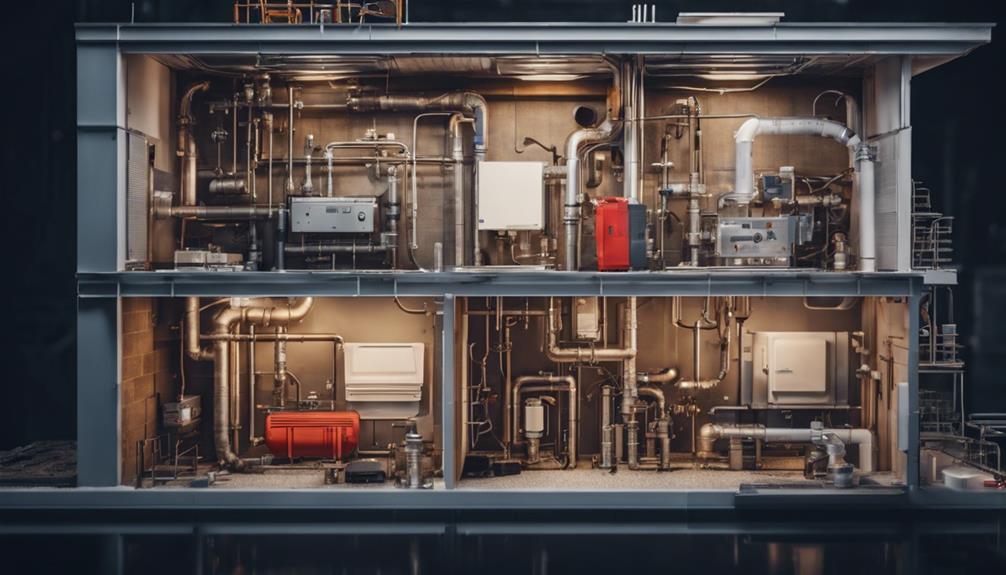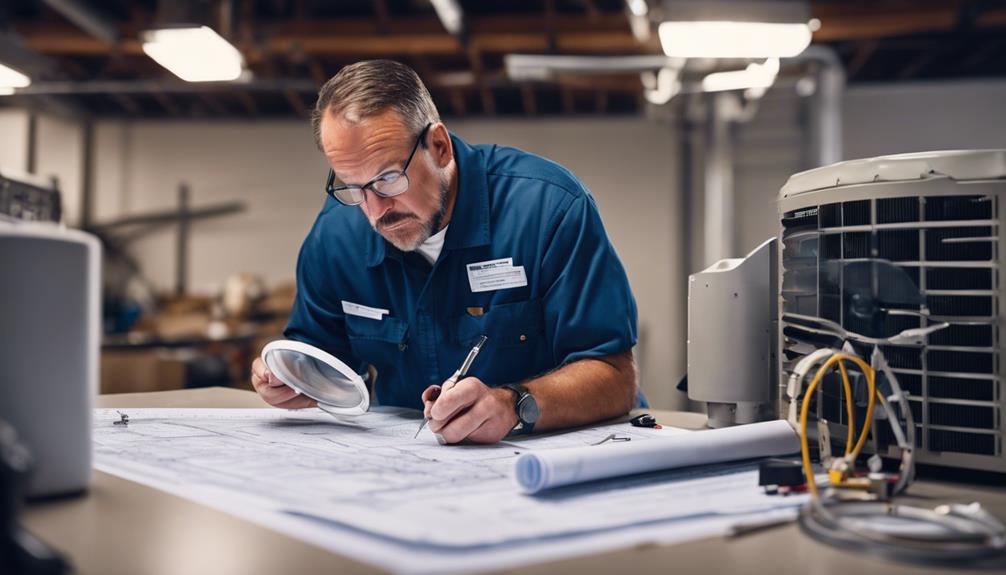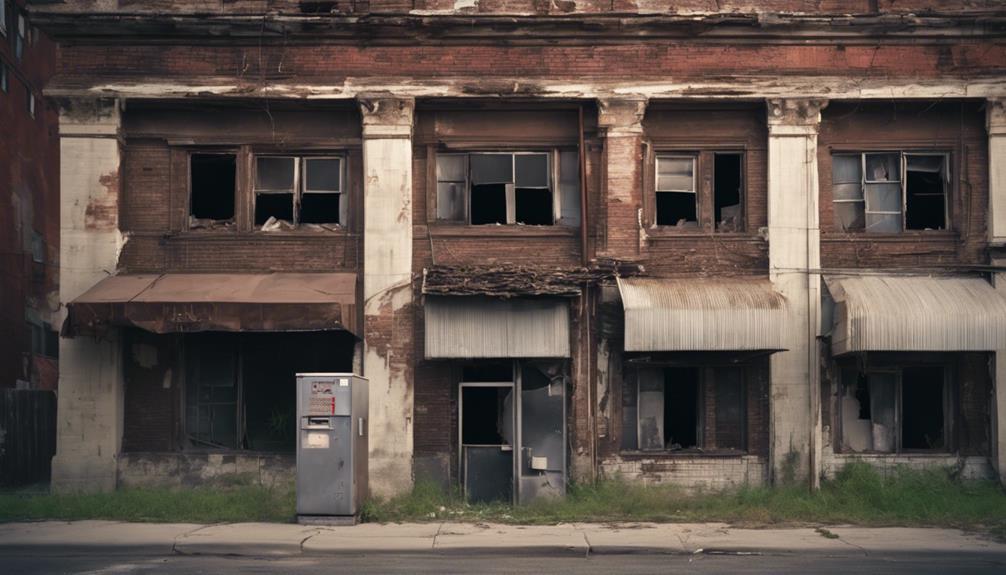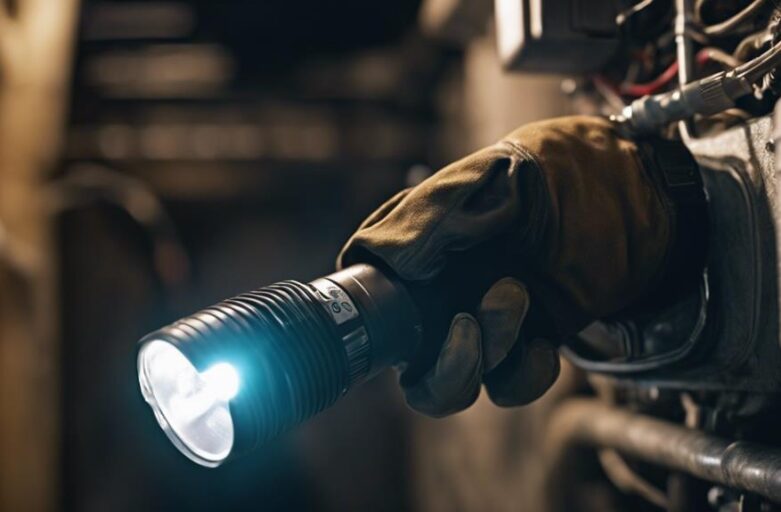You're a superhero for your local buildings! How? You're inspecting the heating, cooling, and plumbing systems. This means you're making sure everything works right. When you find problems early, they're easier to fix.
You're also making sure the buildings are using energy wisely and following safety rules. All this helps to make the buildings work better, keeps repair costs down, and keeps everyone safe and comfy. Keep doing this, and you'll see how good it can be.
Ready to learn more? Don't be shy! Dive in and find out how these checks can make your building shine.
Key Takeaways
- Checking heating, ventilation, air conditioning (HVAC) and pipes often is needed to keep our buildings safe and working well.
- Experts do these checks to make sure everything is set up right and to find any areas that need fixing or improving.
- It's really important that these checks follow the rules and safety laws for buildings in our town.
- By doing these checks, we can stop problems before they happen, which helps the HVAC and pipe systems last longer and work better.
- If we get the right permits and follow the city's building rules, we can avoid getting into trouble or paying fines.
Importance of HVAC and Plumbing Inspections
HVAC and plumbing inspections are super important for your building. They make sure everything is up to code and safe. Plus, they help spot problems before they become big headaches that cost a lot of money. This gives you a relaxed mind, knowing everything is in top shape.
Think about your HVAC person going through every bit of your system. They make sure it's working at its best, which makes your air cleaner and helps your equipment last longer. It's about more than just having the right temperature – it's about feeling comfy, staying healthy, and being happy.
Then, think about your plumbing system getting a complete check-up. The expert looks at each water pipe very carefully, finding any issues that could become bigger later on. These checks protect your home from harm and help keep everything running smoothly.
Process of HVAC Inspections
Ok, let's break down what happens during HVAC inspections. This is super important because it makes sure your heating, cooling, and air systems are working great, safe, and meet all the right rules.
This job is done by special contractors and city building inspectors who work together to make sure your HVAC gear follows all safety rules and building codes.
It all starts with permits. These aren't just pieces of paper, they're like your golden ticket for a super-detailed check-up that makes sure your HVAC system is as good as the maker says it should be. City building inspectors check to see if everything's installed right, and HVAC pros are there to help you understand this whole process.
Here's a quick rundown:
| Steps | What it Means |
|---|---|
| Permit Application | You start by applying for permits and paying for the inspection. |
| Inspection | City inspectors check out your system, making sure it's installed right. |
| Help from the Pros | Licensed HVAC experts help you understand what's going on. |
| Checking the Rules | Inspectors make sure your system follows all the safety and building rules. |
| More Inspections | If they find any problems, more inspections will be needed. |
Understanding Plumbing Inspection Procedures

Plumbing inspections are super important. They're like a doctor's check-up, but for your building's water and pipe systems. Experts come and take a deep look at all parts of your plumbing, even the hidden bits. They're there to spot any problems that might cause bigger issues later on.
Think of these checks as a shield protecting your building from any plumbing disasters. It's not just a quick peek at your pipes, but a careful look to make sure everything is working the way it should.
For buildings that have been around for a while, it's good to have these checks every year. This can help avoid bigger, more costly issues in the future.
These inspections are done by professional plumbing companies or plumbers who know what they're doing. So, you can be sure your building is in safe hands. With these checks, you can feel secure knowing your building's plumbing is in good shape.
The Role of City Building Inspectors
City building inspectors are like superheroes of your town. They make sure that important things like heating, ventilation, and air conditioning (HVAC) and plumbing systems are installed right, safe, and work as they should be. They're like the guards of your community, making sure the buildings are sturdy and safe.
City building inspectors do a lot of important work. They check HVAC and plumbing systems carefully to make sure they're installed the right way, work properly, and are safe. This helps to keep your buildings secure and in good shape.
But their job isn't just about safety. They also make sure that new buildings and renovations are done well. They help prevent any potential problems and ensure that HVAC and plumbing systems work well. This means everyone can live, work, and play in a comfortable, safe space.
Permits for HVAC and Plumbing Works

Before beginning your heating, ventilation, air conditioning (HVAC), or plumbing project, you need to get special permissions called permits. These permits are super important because they ensure your building is safe and matches up to the safety rules and standards.
These permits are needed for an HVAC installation as they make sure your building is fitting in with the local and state building rules.
When you ask for a permit, a city building inspector checks your plans. They need to be sure your plans align with both the manufacturer's guidelines and the rules of your city. Usually, professionals with a license take care of this process. They make sure everything is perfect. The cost of the permit also includes two inspections. The first one happens during installation and the last one happens when everything is done.
These inspections are very important. They make sure your HVAC or plumbing work is done correctly and safely. This way, everyone in the building can feel safe. If you ignore this process, you might've to pay a big fine. There's also a chance you could create safety problems. So, it's best to follow the permit process. It helps you create a safe building that everyone can feel good about.
Common HVAC and Plumbing Violations
Let's talk about the common mistakes people make with their heating, ventilation, and air conditioning (HVAC) and plumbing systems. When these systems aren't installed right, they can cause a bunch of problems. They can make your bills go up because they use too much energy. They can even cause things like water damage, mold, and dirty drinking water.
One big mistake isn't having enough ventilation in your HVAC system. This can make the air inside your house bad to breathe and cause health problems like allergies and trouble breathing. This mistake mightn't seem important, but it can really harm your health.
Mistakes with plumbing, like leaks, can turn a small problem into a big one. This can end up costing a lot of money to fix. If you don't follow the rules for plumbing, you could be putting yourself in danger. For example, it could lead to your drinking water getting dirty. You don't want to risk your health or safety, right?
Let's work together to spot these mistakes and fix them right away. This will help make our buildings safe, healthy, and efficient. Remember, it's not just about avoiding high bills or annoying repairs. It's about making a place where you can feel safe and comfortable, without worrying about hidden problems that could hurt your quality of life.
Consequences of Non-compliance

Not following the rules for heating, ventilation, and air conditioning (HVAC) and plumbing checks can be a big problem. It's like not doing your homework and getting a bad grade. Local leaders are very serious about these rules, and if you break them, you might've to pay a lot of money.
But it's not just about money. Not having these checks can make buildings unsafe. Think about it like a bike helmet. If you don't wear one and fall off your bike, you could get really hurt. The same goes for buildings. Without proper checks, they could be dangerous for people inside.
And it doesn't stop there. If you don't follow the rules, you might've to deal with other legal problems. For example, you might've to get expensive permits after the fact. That's like being asked to do extra homework after you've already finished. Plus, if you thought you could just sell your house or building to avoid these problems, that mightn't work. Not following the rules can make selling property and dealing with insurance really, really tricky.
Ensuring Building Safety Through Inspections
Making sure buildings are safe is really important. One way we do this is by having regular checks of heating, ventilation, and air conditioning (HVAC) systems and plumbing. The specialists who do these checks are called HVAC contractors, and they're experts at what they do. These check-ups aren't just for fun – they're super important. They tell us if we need special permission to fix or improve our systems.
These checks also make sure that everything is set up right and working well. So, getting permission and having these checks isn't just about rules – it's about keeping your building strong and everyone in it safe and sound.
Conclusion
Always remember, the safety of your building greatly depends on frequent checks of your heating, ventilation, and air-conditioning (HVAC) systems, as well as the plumbing. Ensure you have the right permissions or permits and always be on the lookout for common mistakes that people make.
Not following the rules can be very expensive and also unsafe. The city's building inspectors aren't bad guys – they're here to help make sure your building is safe and works well. So, don't be scared of the inspection process, instead welcome it and always keep your building in top shape.
Remember, the building isn't just a structure, it's your duty to look after it.


